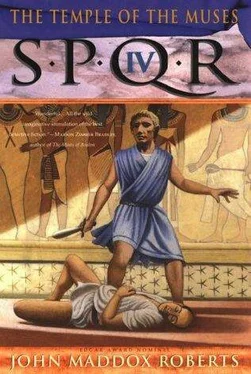John Roberts - Temple Of Muses
Здесь есть возможность читать онлайн «John Roberts - Temple Of Muses» весь текст электронной книги совершенно бесплатно (целиком полную версию без сокращений). В некоторых случаях можно слушать аудио, скачать через торрент в формате fb2 и присутствует краткое содержание. Жанр: Исторический детектив, на английском языке. Описание произведения, (предисловие) а так же отзывы посетителей доступны на портале библиотеки ЛибКат.
- Название:Temple Of Muses
- Автор:
- Жанр:
- Год:неизвестен
- ISBN:нет данных
- Рейтинг книги:5 / 5. Голосов: 1
-
Избранное:Добавить в избранное
- Отзывы:
-
Ваша оценка:
- 100
- 1
- 2
- 3
- 4
- 5
Temple Of Muses: краткое содержание, описание и аннотация
Предлагаем к чтению аннотацию, описание, краткое содержание или предисловие (зависит от того, что написал сам автор книги «Temple Of Muses»). Если вы не нашли необходимую информацию о книге — напишите в комментариях, мы постараемся отыскать её.
Temple Of Muses — читать онлайн бесплатно полную книгу (весь текст) целиком
Ниже представлен текст книги, разбитый по страницам. Система сохранения места последней прочитанной страницы, позволяет с удобством читать онлайн бесплатно книгу «Temple Of Muses», без необходимости каждый раз заново искать на чём Вы остановились. Поставьте закладку, и сможете в любой момент перейти на страницу, на которой закончили чтение.
Интервал:
Закладка:
"That," I said, "to answer your earlier question, is something very like the 'city-taker' of Demetrius the Besieger. It was the biggest siege tower ever built, and I think this one may be even bigger."
Then, amid a hideous groaning and squealing, the colossal thing began to move. Slowly, painfully, it lurched forward a foot at a time as the men inside it and atop it cheered. Of course, one expects siege towers to move, else they would be of little use, but they are always pushed by oxen or elephants or at least a crowd of slaves or prisoners. But this outrageous device moved with no visible means of propulsion. Besides, there was something unnatural about anything so large moving at all. If I had not already been as low as I could get, my jaw would have dropped.
"Magic!" Hermes squealed. He tried to get up, but I grabbed his shoulder and held him fast.
"It's not magic, you young idiot! It's driven by some sort of inner mechanism, a windlass or capstan of some sort, a thing of gears and wheels and teeth. I was studying drawings of such things just last night."
Actually, I had only the vaguest idea of what it might be. Even the simplest waterwheel seemed intolerably complex to me. Still, I preferred to think that there was some mechanical explanation. I had only the most minimal belief in magic and the supernatural. Besides, if the Egyptians possessed magic so powerful, how would we manipulate them so easily?
A trumpet sounded and all the soldier-engineers dropped their tools and left their engines. The duty day was over. Perhaps twenty men filed out of the tower. Last of all came about thirty oxen from the interior. Then a gang of slaves went in with baskets and shovels to clean up after the oxen. So much for magic.
"Seen enough?" Hermes asked.
"Our boatman won't be back for us until tomorrow. I want a closer look. Let's go back to the orchard. It will be dark enough soon." We reversed our earlier progress, slithering rearwards until we were safely among the trees.
Two hours later, we passed through the grass again, walking this time, but crouched low. Slowly and with great caution, we made our way to the edge of the parade ground. Had this been a Roman encampment, we would have been challenged by sentries, but these were barbarians, lazy and incompetent, for whom soldiering was scarcely more professional than the tribal warrioring of their native lands. That they were within their own territory with no enemy for a thousand miles was no excuse. The legions fortify every camp even if they are within sight of the walls of Rome. Still, it was convenient for us.
The machines stood like dead monsters in the moonlight as we walked up to them. They were made of wood that had been painstakingly cut and shaped, then sanded smooth and in some cases painted. War engines are usually built at the site of a siege and are made of rough-hewn wood and are often abandoned when the fighting is over, after the ironmongery and the ropes have been salvaged.
Even with my inexperienced eye, I could see that these machines were held together by pins and wedges, so that they could be disassembled for transport. That, I guessed, was an innovation of Iphicrates. Egypt has little native wood save for palm, a soft and fibrous material unsuitable for such work. All of this wood had to be imported, shiploads of it.
We walked to the base of the tower, which gave off a powerful, disagreeable smell.
"What's that stink?" Hermes asked.
"It takes a lot of oil to keep this much iron from rusting," I told him. "There's enough here to make armor for three legions." I fingered a plate that had pulled a little loose from the frame. It was good metal, about the thickness of body armor. I walked up the back ramp and looked inside, but it was far too dark to see, only a little moonlight coming through the ports that had been left open. Despite the efforts of the slaves, the interior smelled strongly of oxen. This, mixed with the stench of rancid olive oil, finally drove me away.
The other machines told me little more. They were all as ingeniously designed and lovingly built. I assumed that the more commonplace machines all incorporated some improvement of Iphicrates's design, if only in their ease of transport and reassembly.
"What do we do now?" Hermes asked as I stepped off the ramp.
"We could have a look at those buildings," I said, "but they're probably just barracks and storerooms. Whatever is going on is happening in Alexandria. This is just a training facility and arsenal." I thought for a while. "It might be fun to set fire to all this."
"Let's do it!" I could hear the grin in his voice. "I could sneak a torch from one of those buildings, and there must be plenty of oil jars in the storehouses to keep all this metal greased. We could have everything alight before they know what's going on!" Arson was an unthinkable crime in Rome, so it was one he might never get a chance to commit at home.
"But then they'd sweep the area to find the culprits. They may not be much as soldiers, but they probably know how to make a search for fugitives."
"Maybe we'd better not, then."
"And I might need all this as evidence."
"Evidence of what?"
It was a good question. Rome would look with great disfavor upon this development, but would the Senate take action? I rather doubted it. And what had it all to do with the murder of Iphicrates? With these questions unanswered, we made our stealthy way back to the lakeside.
Chapter VIII
One of the requirements for a career in Roman politics is an onerous but necessary apprenticeship in the civil service. Nobody likes it, but at least it teaches you how a state works. This is why kings so often rule badly. They know public life only from the top. They like the enjoyable parts: fighting and killing their enemies, lording it over everybody else, being above the law. But the rest of it bores them, and they leave it to men or sometimes eunuchs who may have ambitions of their own. Since the kings don't know how the business of government operates, they don't know that their flunkies are incompetent, or are robbing or even subverting them.
Washed free of mud and soot and dressed decently once more, I presented myself at the Land Office, a sizable government building near the Palace. I knew that here I would find the exact boundaries and ownership of every square inch of land in Egypt. The Egyptians invented the art of surveying out of necessity, since their lands are inundated yearly and boundary markers are often swept away. Like most conquerors, the Ptolemies had adopted the most beneficial practices of the conquered people, and this office was staffed almost entirely by native Egyptians. In the first room I entered, a public slave hurried over, bowing.
"How may I help you, sir?"
"Where might I find maps and documents concerning the lands nearest Alexandria?"
"Please come with me." We walked past rooms where scribes sat cross-legged in the Egyptian fashion, papyrus resting on their tight-stretched kilts, brushes in their hands, inkpots resting on the floor next to them. Others labored over maps spread on long tables.
"This is the Office of the Royal Nome, Senator, and this is Sethotep, Royal Overseer of the Northern Survey."
The man rose from his desk and came forward. He was a native and simply dressed, but by now I had learned to judge status by the quality of a man's wig and the weave of his kilt. Sethotep was a high-ranking functionary, about equivalent to a Roman equite. We made the expected introductions and I launched upon the story I had made up.
"I have embarked upon a work of geography concerning Egypt. There has been none in Latin in more than fifty years, and the earlier works are translations from Greek and consequently riddled with errors. I think we need an original book of our own."
Читать дальшеИнтервал:
Закладка:
Похожие книги на «Temple Of Muses»
Представляем Вашему вниманию похожие книги на «Temple Of Muses» списком для выбора. Мы отобрали схожую по названию и смыслу литературу в надежде предоставить читателям больше вариантов отыскать новые, интересные, ещё непрочитанные произведения.
Обсуждение, отзывы о книге «Temple Of Muses» и просто собственные мнения читателей. Оставьте ваши комментарии, напишите, что Вы думаете о произведении, его смысле или главных героях. Укажите что конкретно понравилось, а что нет, и почему Вы так считаете.









